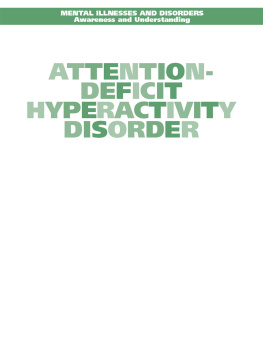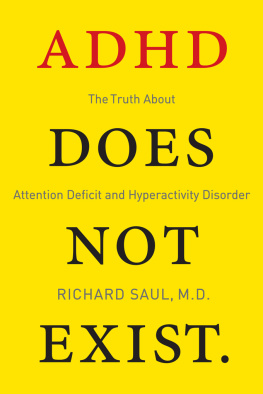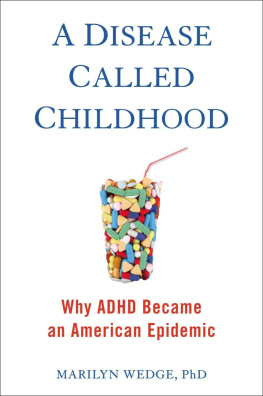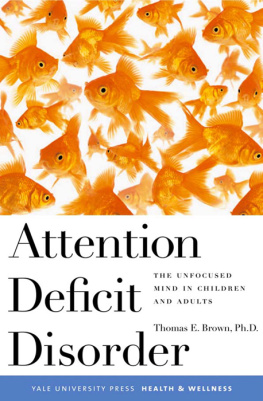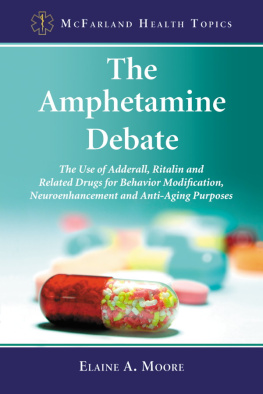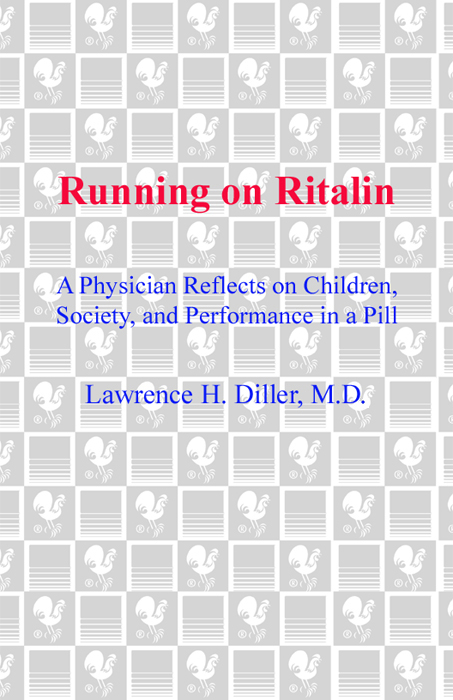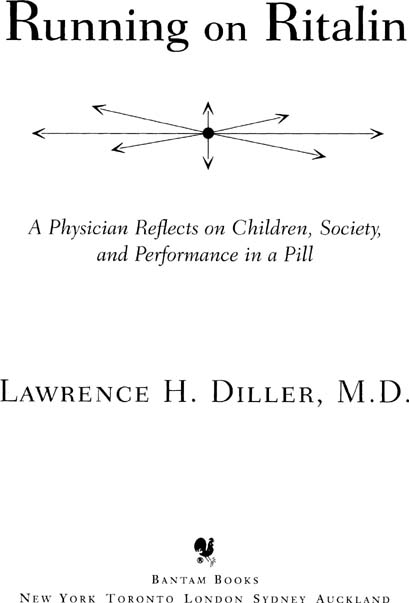MORE PRAISE FOR DR. LAWRENCE H. DILLERS RUNNING ON RITALIN
Running on Ritalin describes in vivid detail the performance pressures on Americas children, their parents, and teachers that result too often in a prescription for Ritalinand nothing else. This important book should be read by teachers, principals, counselors, and everyone else interested in the well-being of our children. Ramon C. Cortines, Executive Director, Pew Network for Standards-Based Reform at Stanford University; Interim Director, Annenburg Institute for School Reform at Brown University
A very important book Dr. Diller has correctly described the chaos of the current ADHD diagnosis; the disturbing trend of blaming childrens social, behavioral, and academic performance problems entirely on an unproven brain deficit; and the consequent enormous and generally inappropriate reliance on Ritalin as the remedy. This is the most thorough and reliable book available to help parents and professionals understand and cope with their crisis. William B. Carey, M.D., Director of Behavioral Pediatrics, Childrens Hospital of Philadelphia; author of Understanding Your Childs Temperament
Parents whose kids take the stimulant Ritalin for Attention Deficit Hyperactivity Disorder usually find themselves wondering about the value of using Ritalin. Anyone with doubts should read this thoughtful book by child psychiatrist Dr. Lawrence H. Diller. He is not anti-Ritalin; he prescribes it for some children. But [he] raises many important issues about why Ritalin use has increased in the United States and whether it is the appropriate response to a childs difficulties. Los Angeles Times
An excellent opportunity to learn about methods of diagnosing ADD, various treatments of it, and related problems This thought-provoking book should help anyone genuinely concerned with ADD and ADD-like problems. Booklist
Well-reasoned guidance for parents and teachers who must deal with this controversial issue. The Dallas Morning News
No parent who has ever considered medication use for their child should make the decision without first reading Running on Ritalin. This superbly written, carefully researched book should also be required reading for primary care providers, mental health professionals, teachers, and all others who have the best interests of children in mind. Stanley Turecki, M.D., author of The Difficult Child and Normal Children Have Problems, Too
Dr. Diller engages and inspires us with his genuinely sweet candor and personal inquiry. His honest questions cause the reader to consider the limits of treating only the symptoms of ADD, rather than individuals in their social context. The stories, the science, the insight, and the recommendations all guide us toward a hopeful perspective. Peter A. Gorski, M.D., M.P.A., Past President, Society for Developmental and Behavioral Pediatrics
In this thoughtful and objective book, Diller addresses the history of the ADD diagnosis, the benefits of drug treatment, and what he believes is the willingness of some doctors to medicate something that is not a disorder at all: childhood. American Way
Well-researched loaded with practical and interesting information Dr. Diller presents a balanced and solid argument . Running on Ritalin is an important and informative book for all primary care providers, specialists, and parents . [It] should be on the shelf of everyone who cares for children, adolescents, and adults with ADD. Developmental & Behavioral News
A provocative new book that raises troubling questions about the Ritalin boom, and the growing trend to correct behavior problems in children with a drug. The Ottawa Citizen
Dedicated
to
Helen Gofman, M.D., Bayard Allmond, M.D.,
and Alan Leveton, M.D.
and to
My Parents
Contents
Chapter 1
R ITALIN A SCENDANT :
A Doctors Dilemma
Chapter 2
S TIMULANT OF C HOICE :
The Myths and Reality of Ritalin
Chapter 3
A TTENTION D EFICIT D ISORDER :
In the Eye of the Beholder
Chapter 4
C OPING WITH A L IVING I MBALANCE :
ADD-ogenic Forces in Families, Schools, and Society
Chapter 5
B LAMING J OHNNYS B RAIN :
The Power of the Biological Paradigm
Chapter 6
W ELCOME TO R ITALIN N ATION :
An ADD Culture Arises
Chapter 7
M AKING A CCOMMODATIONS :
ADD in an Age of Victims Rights and Managed Care
Chapter 8
T HE P OLITICALLY C ORRECT P ARENTING T RAP :
How Coping with Difficult Kids Gets Harder
Chapter 9
E VALUATING FOR ADD:
The Child in His World
Chapter 10
A DDRESSING THE I MBALANCE :
Non-Drug Treatments for ADD
Chapter 11
T HE M EDICATION O PTION :
Making the Most of a Drug Intervention for ADD
Chapter 12
R ITALIN B EYOND C HILDHOOD :
Teenagers, Adults, and ADD
Chapter 13
P ERFORMANCE IN A P ILL :
What Ritalin Says About Us
A CKNOWLEDGMENTS
My wife, who is a writer, told me that writing a book is like running a marathon. I am a sprinter by nature, so I was helped by many people who offered me support, suggestions, and advice over the time it took to write this book.
My patients have been extraordinarily generous. Not only have they given me much of the material for this book by my encounters with them but their support and excitement for this endeavor have astonished me.
I thank supporters of my efforts for their suggestions, advice, or assistance: John Jacobs, Lane Tanner, Tom Boyce, Paul Dworkin, Jon Weil, Sabina Morganti, Mary-Jane Nunes, Sue Parry, Jill Woolfson, Kathy Pavloff, Peggi Levin, and Sarah Pearce.
Robert Coles, Sir Michael Rutter, Robert Reid, John S. Werry, and Paul Genova were generous in giving me their time, ideas, and encouragement. At the Drug Enforcement Administration, initially Frank Sapienza and then, on a continuing basis, Gretchen Feussner were regularly available and ready to provide data and support.
More is published in the professional and lay literature on ADD and Ritalin than for any other combination of childhood psychiatric condition and its treatment. Literally each week brings up another group of articles or books to be reviewed. Furthermore, given the broad scope of this book, I was in dread of both large and small errors persisting in the text. Therefore, I was very fortunate to have the experience and interest of Stephen Hinshaw of the University of California, Berkeley, and Glen Elliott of the University of California, San Francisco, who reviewed the book for technical accuracy. I am extremely grateful for their time and comments.
Helen Reyes, librarian of John Muir Medical Center in Walnut Creek kept her eye out for the interesting article I might miss early in my research. I paid nearly weekly visits to the still spectacular University of California Library Systemsin particular, the Medical Library at the San Francisco campus and the Education/Psychology Library on the Berkeley campus.
Fred Gardner, the editor of Synapse, the medical student newspaper of University of California, San Francisco, was the first to tell me there was a book to be written on Ritalin. He also provided early editorial assistance and was crucial in the development of the proposal for this book.
Diana Landau of Walking Street Press in San Francisco, who is my friend and ex-neighbor, took over editing the manuscript. The modestly self-described Cut and Paste Queen of the Bay Area provided so much morewonderful transitions and metaphors as well as egoless editing toward the completion of the manuscript. If I could, I would award her an honorary medical degree in ADDology.


